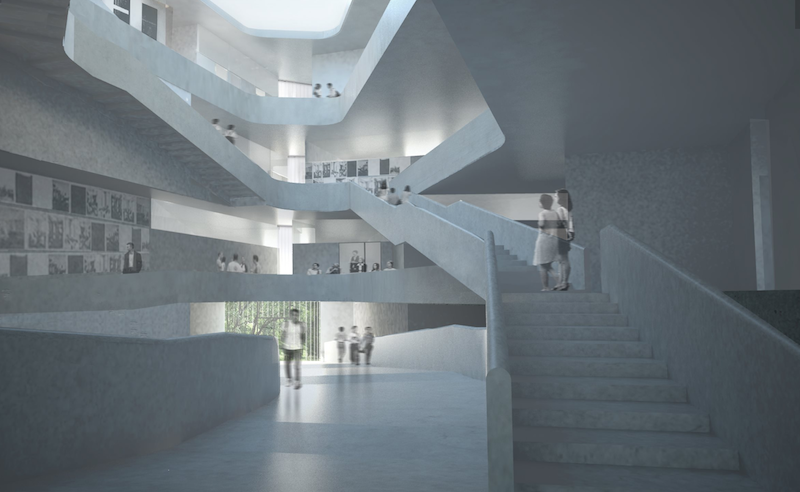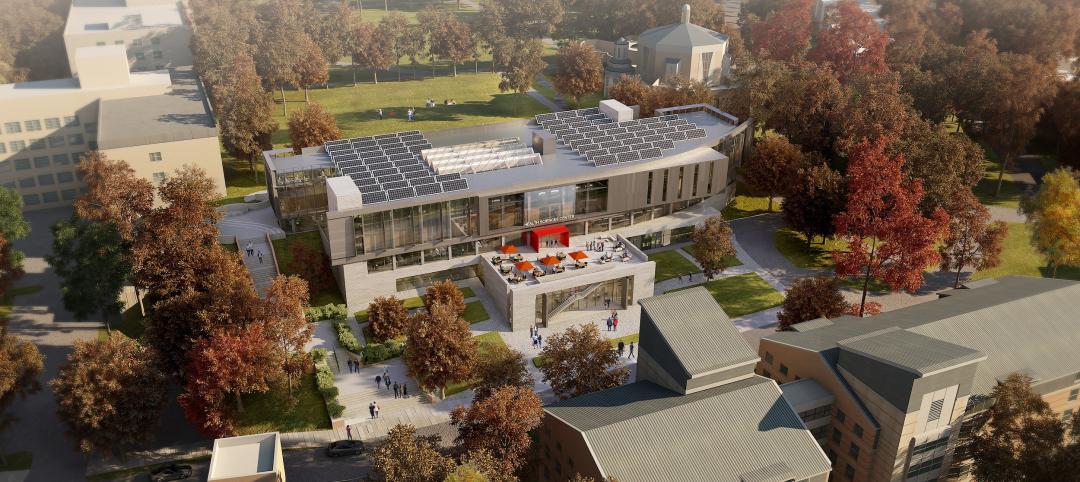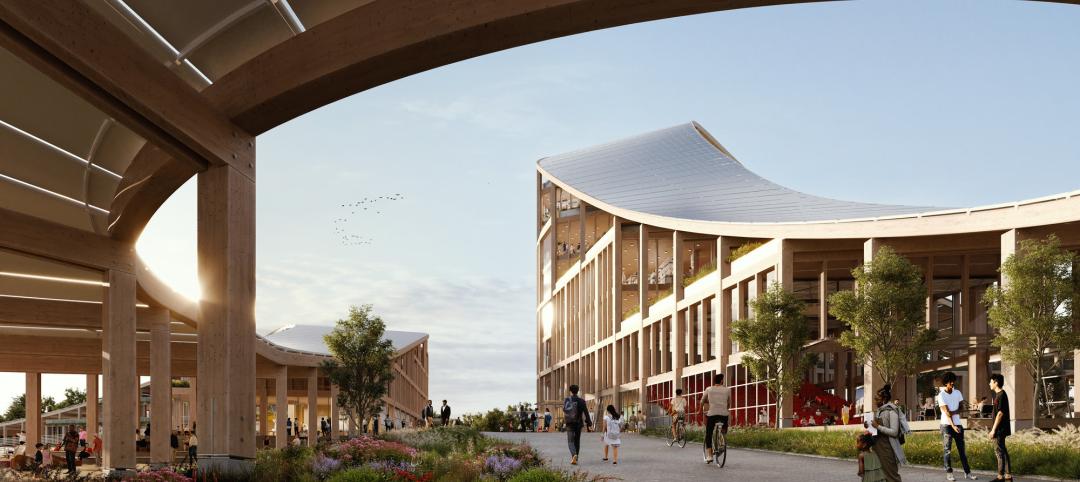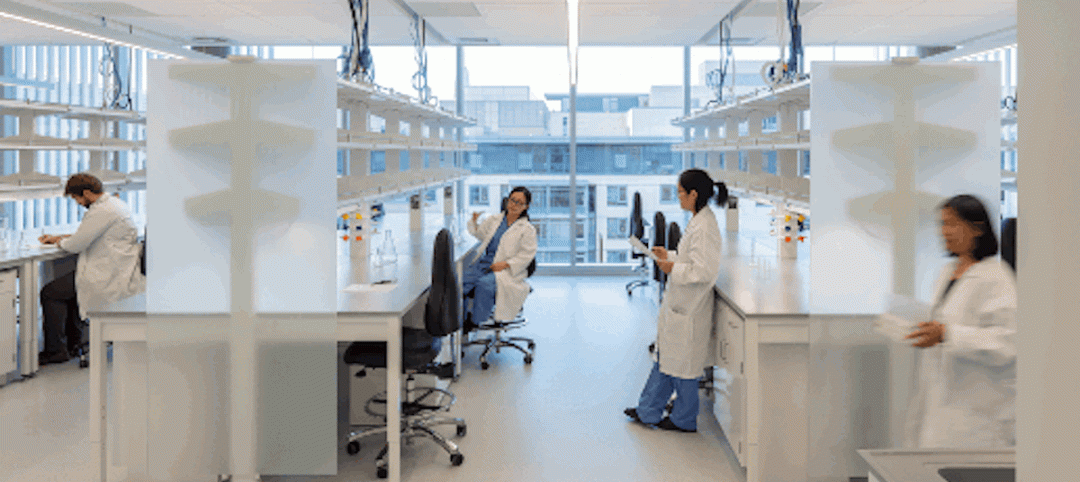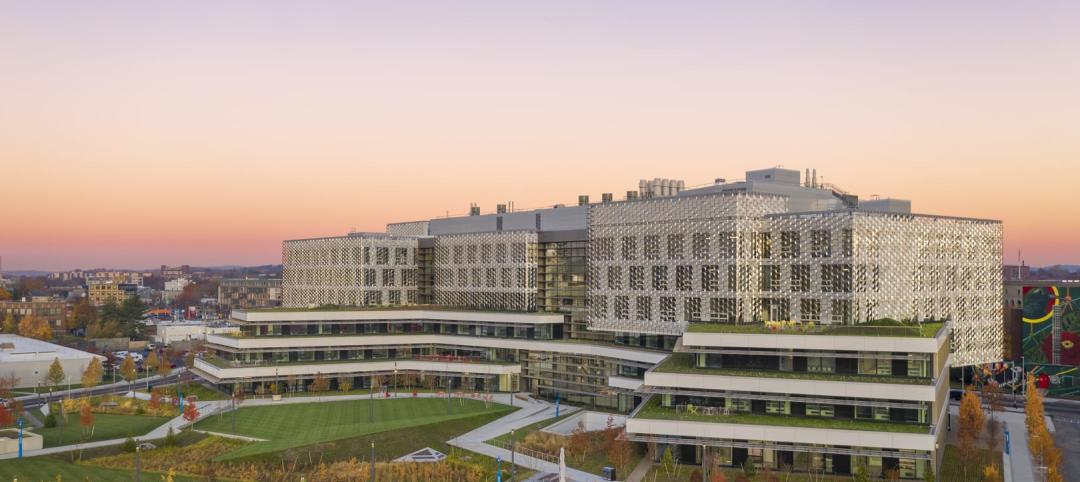The University of Iowa’s new Visual Arts Building is a 126,000-sf facility that will house the functions of the School of Art & Art history, which were previously held in the university’s 1936 Art Building. The new building provides a space for ceramics, sculpture, metals, photography, printmaking, 3D design, intermedia, animation, and graphic design. There is also space for graduate student studies, faculty and staff studios and offices, and gallery space.
The Visual Arts Building uses a punched concrete frame structure composed of cast-in-place concrete to provide thermal mass at the exterior of the building. Meanwhile, “bubble” slabs that incorporate the Cobiax bubble deck system provide radiant cooling and heating.
BNIM, which worked in collaboration with Steven Holl Architects, designed the irregular shape of the building through the use of computer modeling software. This same software was also used to coordinate the installation of the exposed mechanical pipes and ductwork, which proved to be a complex task.
Significant daylighting, natural ventilation at the atrium skylight, thermal mass storage, a thermal active slab heating and cooling system, and highly efficient HVAC systems are key components of the design.
These design components work toward the ultimate goal of the building, which is to provide as much connection and communication between departments as possible. A key aspect of this is the vertical carving out of large open floor plates. Additionally, several vertical cutouts are designed to increase the interaction between the facility’s four levels. The stairs have also been shaped to increase interaction and discussion among the building’s users. Some of the sculptural open stairs stop at large landings with tables and chairs while others open into lounge spaces with built in seating.
The Visual Arts Building officially opened on Oct. 7.
Related Stories
University Buildings | May 5, 2023
New health sciences center at St. John’s University will feature geothermal heating, cooling
The recently topped off St. Vincent Health Sciences Center at St. John’s University in New York City will feature impressive green features including geothermal heating and cooling along with an array of rooftop solar panels. The geothermal field consists of 66 wells drilled 499 feet below ground which will help to heat and cool the 70,000 sf structure.
Mass Timber | May 1, 2023
SOM designs mass timber climate solutions center on Governors Island, anchored by Stony Brook University
Governors Island in New York Harbor will be home to a new climate-solutions center called The New York Climate Exchange. Designed by Skidmore, Owings & Merrill (SOM), The Exchange will develop and deploy solutions to the global climate crisis while also acting as a regional hub for the green economy. New York’s Stony Brook University will serve as the center’s anchor institution.
University Buildings | Apr 24, 2023
Solving complicated research questions in interdisciplinary facilities
University and life science project owners should consider the value of more collaborative building methods, close collaboration with end users, and the benefits of partners who can leverage sector-specific knowledge to their advantage.
Green | Apr 21, 2023
Top 10 green building projects for 2023
The Harvard University Science and Engineering Complex in Boston and the Westwood Hills Nature Center in St. Louis are among the AIA COTE Top Ten Awards honorees for 2023.
Higher Education | Apr 13, 2023
Higher education construction costs for 2023
Fresh data from Gordian breaks down the average cost per square foot for a two-story college classroom building across 10 U.S. cities.
Market Data | Apr 11, 2023
Construction crane count reaches all-time high in Q1 2023
Toronto, Seattle, Los Angeles, and Denver top the list of U.S/Canadian cities with the greatest number of fixed cranes on construction sites, according to Rider Levett Bucknall's RLB Crane Index for North America for Q1 2023.
University Buildings | Apr 11, 2023
Supersizing higher education: Tracking the rise of mega buildings on university campuses
Mega buildings on higher education campuses aren’t unusual. But what has been different lately is the sheer number of supersized projects that have been in the works over the last 12–15 months.
Contractors | Apr 10, 2023
What makes prefabrication work? Factors every construction project should consider
There are many factors requiring careful consideration when determining whether a project is a good fit for prefabrication. JE Dunn’s Brian Burkett breaks down the most important considerations.
Smart Buildings | Apr 7, 2023
Carnegie Mellon University's research on advanced building sensors provokes heated controversy
A research project to test next-generation building sensors at Carnegie Mellon University provoked intense debate over the privacy implications of widespread deployment of the devices in a new 90,000-sf building. The light-switch-size devices, capable of measuring 12 types of data including motion and sound, were mounted in more than 300 locations throughout the building.
Architects | Apr 6, 2023
New tool from Perkins&Will will make public health data more accessible to designers and architects
Called PRECEDE, the dashboard is an open-source tool developed by Perkins&Will that draws on federal data to identify and assess community health priorities within the U.S. by location. The firm was recently awarded a $30,000 ASID Foundation Grant to enhance the tool.


